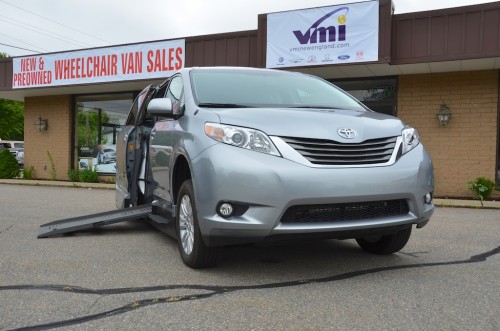
Toyota Wheelchair Van Payment Considerations
You’ve found the perfect Sienna. Now you need to think about how you’re going to pay for your Toyota wheelchair van. Different situations call for different actions. Here are some tips that can help you make the payment process easier whether you’re working with a dealer, an individual seller or need to pay for additional wheelchair van modifications.
When purchasing from a Toyota mobility dealer, you want to take smart actions that will protect you against paying too much for your wheelchair van. Here are a few ideas:
Buy at the right time.
Did you know that you can get the best deals during the last few weeks of the year and during the months of July through September? Prices tend to be lower during those periods.
Resist the extras.
Your Toyota dealer will undoubtedly offer you extra features and protections. Some may be great investments. Others may be unnecessary. Be smart and resist sales pitches for the extras you don’t need.
Know the market.
Investigate what other dealers are doing and what is happening overall in the marketplace. Knowledge is power. That information will protect you from paying too much and can help you negotiate the best possible deal.
When purchasing your Toyota wheelchair van from a private seller, you’ll want to use a cashier’s check from your bank or a money order. This protects both parties and avoids risks associated with the three most common alternatives.
Sellers don’t want your personal check. You’re not the only person who will want to make paying for your Toyota wheelchair van safe and convenient. The seller will be interested in protecting himself or herself, too. A personal check requires a leap of faith on the part of the seller. He or she probably won’t take it.
Cash is too risky.
You don’t want to pay for your vehicle in cash. It doesn’t create a paper trail and it’s simply unsafe to visit someone you don’t really know with a large quantity of cash on your person.
Moneygrams and Western Union are not a good idea. These services exist so that people who know one another can send money in a pinch. They’re poorly designed for transactions like this. Additionally, these services are frequently used by those who are less interested in getting you a nice Sienna and more interested in robbing you!
Paying for your Toyota wheelchair van may be only part of a bigger picture. You may also need to pay for conversions to the vehicle in order to make it a perfect wheelchair van for you. Here are a few considerations to keep in mind when paying for conversions.
Look for “free” money.
Before you spend your own money on conversions, find out if you’re eligible for any government assistance. You should also check with your health insurance or worker’s compensation insurance to find out if your situation will compel them to pick up part of the overall modification bill.
Work with the dealer.
In many cases, your Toyota dealer can include the costs associated with wheelchair van modifications into your auto loan. That leaves you with only one monthly payment and may allow you to finance equipment and conversion services at a lower interest rate.
Visit your doctor. See your doctor and find out if you can get a written prescription for your wheelchair adaptations. If you have a prescription, you may be exempt from paying sales tax on your conversion.
Following recommendations like these can make paying for your Toyota less expensive and more convenient.

